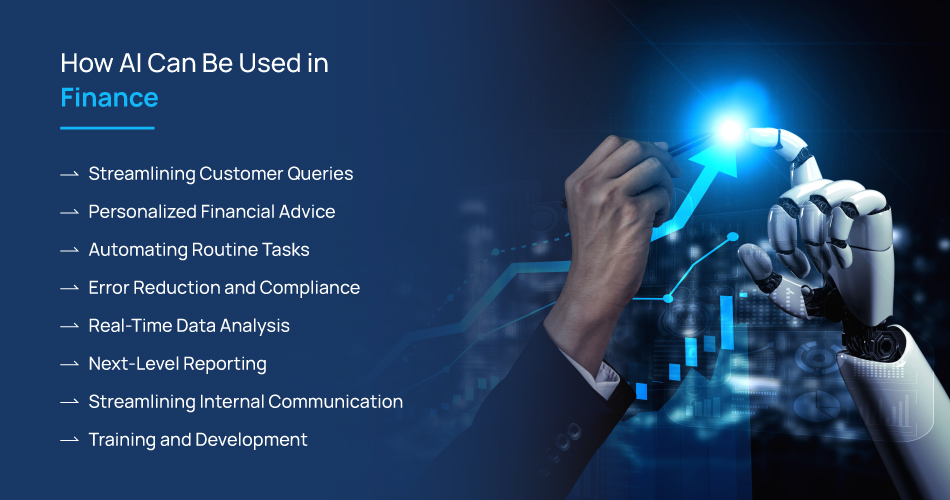Imagine a world where your financial operations are as smooth as a well-oiled machine, where customer interactions are not just transactions but experiences, and where efficiency is not an aspiration but a daily reality.
This is not a glimpse into a distant future; it’s the present, shaped by the integration of AI chatbots in the finance sector.
In the modern landscape, the merge of artificial intelligence (AI) and financial operations is not just enhancing efficiency; it’s redefining it.
As we dive deep into the use of AI chatbots in finance, buckle up to uncover how they are not just tools, but catalysts of change in a domain where precision and speed are paramount.
In this article, we’ll go through how companies are using AI chatbots and what potential use cases are.
So, without further ado, let’s get going.

The Emergence of AI Chatbots in Finance
The financial sector has witnessed a significant shift from traditional practices to technologically advanced solutions, with AI playing a pivotal role.
Chatbots, powered by AI, are redefining the norms of financial interactions, offering enhanced capabilities that go beyond mere transactional support.
These tools, equipped with advanced algorithms, are capable of understanding and processing vast amounts of data, facilitating quicker decision-making and more efficient operational processes.
Understanding Conversational and Generative AI
At the heart of AI chatbots lie two crucial technologies: Conversational AI and Generative AI.
Conversational AI focuses on understanding and responding to user queries in natural language, making interactions seamless and intuitive.
Generative AI takes this a step further by creating responses that are not just pre-programmed but dynamically generated based on the context of the conversation. This technology enables chatbots to provide personalized and relevant responses, mimicking human-like interactions.
The Crucial Role of AI Chatbots
AI chatbots are transforming the finance sector by automating customer service, enhancing the accuracy of financial advice, and ensuring compliance with regulatory standards.
They serve as the first point of contact for customers, handling inquiries and transactions efficiently, thereby freeing human agents to focus on more complex tasks. This shift not only optimizes operational efficiency but also significantly improves customer satisfaction.
However, it’s not just about AI chatbots, BFSIs are continuously adopting AI technology as a whole for different purposes.
So, let’s explore the role of AI in financial operations in a bit more detail.

A. Enhancing Customer Interactions with AI
Let’s understanding how AI can help take customer interactions to the next level:
Streamlining Customer Queries
One of the primary challenges in the finance sector is managing the high volume of customer queries.
AI chatbots have an ability to handle multiple interactions simultaneously. And as a result, AI-powered customer service can offer a solution to response delay in customer service. They can quickly sift through data, understand customer inquiries, and provide accurate and timely responses.
This efficiency is exemplified by Morgan Stanley, which successfully implemented AI chatbots to allow bankers use the virtual assistant to find research and forms quickly. With this breakthrough in place, bankers won’t have to sift through hundreds of thousands of documents manually.
Personalized Financial Advice
Traditional financial advice has often been generalized and not tailored to individual needs. It is because agents cannot go through the entire financial history of a particular customer before getting in touch with them.
AI chatbots revolutionize this aspect by offering personalized financial advice based on customer’s financial history, preferences, and goals. They can do it because they can access and process the financial status of the customer in less than a minute.
For instance, Bank of America is making substantial investments in artificial intelligence (AI), machine learning, and business intelligence to deepen its understanding of individual financial preferences. This strategic move aims to empower the bank to provide personalized insights, advice, and resources tailored to each client’s unique needs, especially at critical junctures.
B. Operational Efficiency through Automation

When AI technology was introduced, its primary purpose was to automate the mundane jobs that humans have to do. And it’s still among the top use cases of AI as it is directly associated with the operational expenses. AI can help companies reduce the costs significantly.
In addition to the cost, there are other areas where AI chatbots can help improve operational efficiency. Let’s explore the two of the most common automation use cases of AI in BFSI.
Automating Routine Tasks
The BFSI sector is often burdened with repetitive and time-consuming tasks. AI chatbots excel in automating these tasks, such as account management, transaction processing, and basic customer queries.
According to a report by Goldman Sachs, generative AI is expected to act primarily as a supporting force across various job sectors. However, its influence in the legal industry stands out as potentially more disruptive compared to other fields.
The report highlights the likelihood of a significant number of legal roles facing the risk of automation due to advances in generative AI technology.
Error Reduction and Compliance
Manual processes in BFSIs are prone to errors, which can have significant implications, including non-compliance with regulations.
AI chatbots minimize these risks by ensuring accurate data handling and adherence to regulatory standards.
C. Data Analytics and Reporting

Business intelligence is powered by the data that banking and financial institutions gather from customers as well as internal operations. And AI is the best trigger for generating intelligence from data.
Real-Time Data Analysis
In the finance sector, real-time data analysis is crucial for making informed decisions. AI chatbots can process vast amounts of data in real-time, providing insights into customer behavior, market trends, and operational performance.
Advanced Reporting Capabilities
Accurate and efficient reporting is vital in finance for tracking performance and making strategic decisions. Developing AI chatbots enhance reporting capabilities by automating data collection and report generation.
D. AI Chatbots for Internal Operations

The need for operational efficiency is never ending, be it any form of company or industry the company deals in.
Streamlining Internal Communication
AI chatbots are not just for customer-facing roles; they also play a significant role in internal operations. They can facilitate internal communication, schedule meetings, and manage workflows.
Training and Development
In the BFSI sector, AI chatbots are increasingly used for training and development. They offer personalized learning experiences, simulate real-life scenarios, and provide instant feedback.
Future Trends in AI Chatbots for BFSI
We’re just scratching the surface of the possibilities of AI in every sector. Compliance-intensive industries like BFSI and healthcare need to be careful when adopting AI use cases. The following seems to be the future of AI in BFSI.
Evolving AI Capabilities
The future of AI chatbots in finance is marked by advanced capabilities such as predictive analytics, natural language understanding, and emotional intelligence. Industry leaders predict these evolving capabilities will further enhance customer experience and operational efficiency.
Integrating with Emerging Technologies
The integration of AI chatbots with emerging technologies like blockchain, IoT, and advanced analytics promises to unlock new potentials in the finance sector. This synergy will drive innovation, improve security, and offer more comprehensive financial solutions.
Strategic Implementation: The Key to Unlocking AI’s Full Potential
Implementing AI chatbots in the finance sector isn’t just about deploying technology; it’s about strategically aligning it with business goals. Successful integration requires a deep understanding of customer needs, operational workflows, and long-term objectives. It involves a systematic approach where AI is not just an add-on but an integral part of the customer service strategy.
Financial institutions must also prioritize continuous learning and adaptation for their AI systems. As customer behaviors evolve and new financial products emerge, AI chatbots must be trained and updated to stay relevant and effective. This ongoing process not only ensures accuracy but also enhances the chatbots’ ability to offer up-to-date financial advice and services.
The Future: AI Chatbots as Financial Advisors
Looking ahead, the role of AI chatbots in finance is set to expand beyond operational efficiency. We’re moving towards a future where AI chatbots will act as personal financial advisors. Equipped with deep learning and predictive analytics, they will provide customized investment advice, risk assessment, and financial planning services tailored to individual customer profiles.
This evolution will mark a paradigm shift in how financial advice is delivered, making it more accessible, personalized, and data-driven. As AI technology continues to advance, the finance sector will witness a new era of digital financial advisory services, transforming the traditional advisor-client relationship and democratizing financial planning for a broader audience.






















Leave a comment!